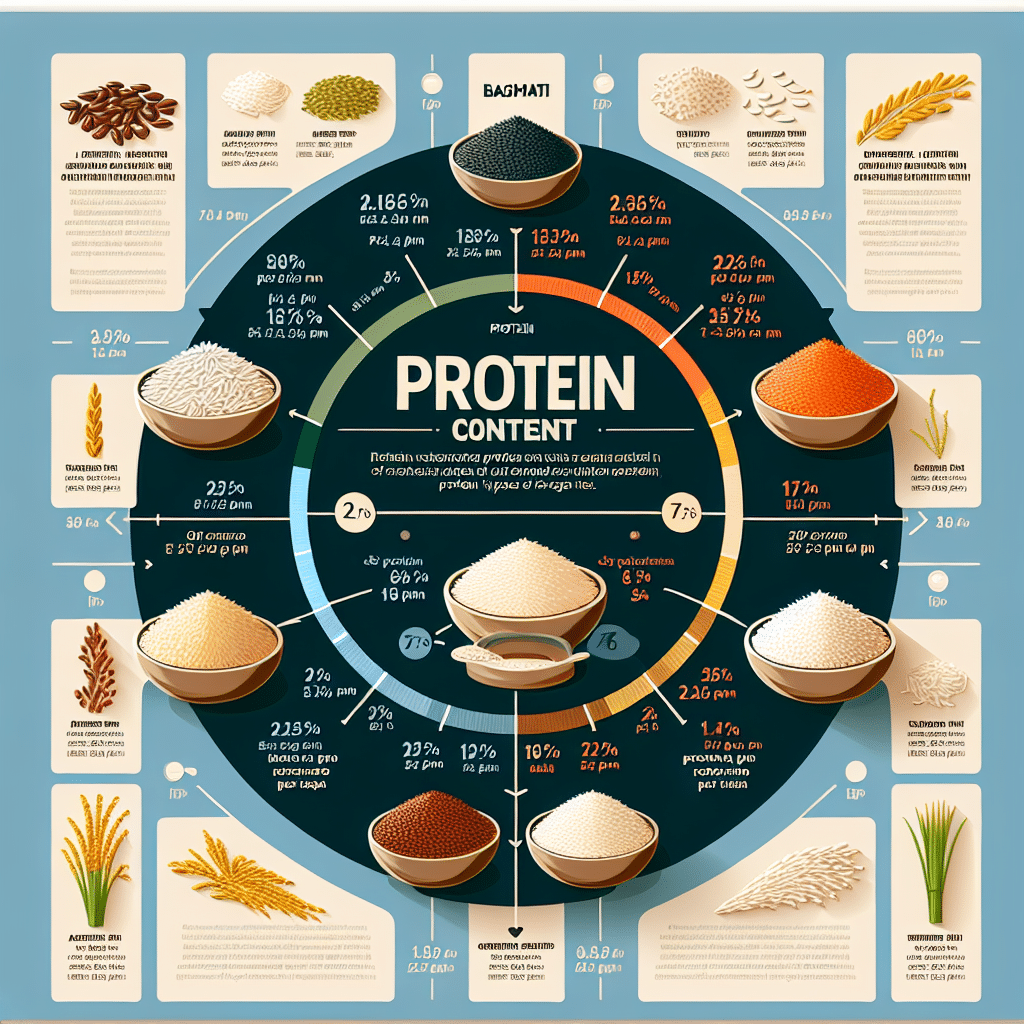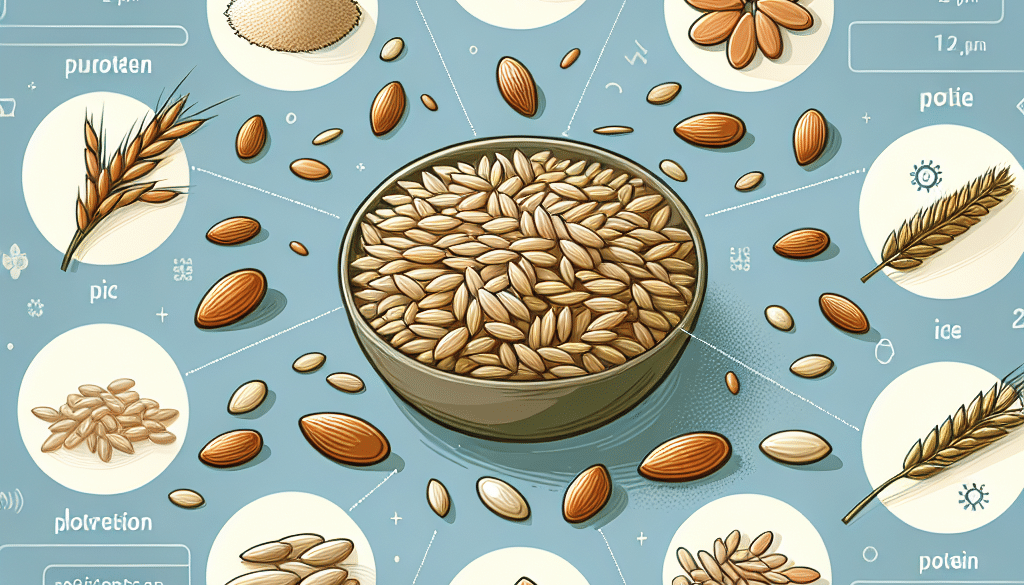Which Rice Is High Rich Protein?
-
Table of Contents
- High-Protein Rice Varieties: A Nutritional Guide
- Understanding Protein in Rice
- Top High-Protein Rice Varieties
- Nutritional Benefits of High-Protein Rice
- Incorporating High-Protein Rice into Your Diet
- Case Studies and Statistics
- Conclusion: The Power of Protein-Rich Rice
- Discover ETprotein’s High-Quality Protein Products
High-Protein Rice Varieties: A Nutritional Guide

When it comes to incorporating protein into our diets, rice might not be the first food that comes to mind. However, certain varieties of rice are surprisingly high in protein, making them an excellent choice for those looking to boost their intake of this essential macronutrient. In this article, we will explore which types of rice are rich in protein, their nutritional benefits, and how they can be included in a balanced diet.
Understanding Protein in Rice
Protein is a vital component of every cell in the body and is essential for building and repairing tissues, making enzymes and hormones, and supporting overall health. While animal products are often associated with high protein content, many plant-based foods, including certain types of rice, can also be excellent sources of protein.
Top High-Protein Rice Varieties
Not all rice is created equal when it comes to protein content. Here are some of the top high-protein rice varieties that you might consider incorporating into your diet:
- Black Rice: Also known as forbidden rice, black rice is rich in antioxidants and contains approximately 8-9 grams of protein per cooked cup (195 grams).
- Wild Rice: Technically a grass, wild rice boasts a higher protein content than most other whole grains, with about 6.5 grams per cooked cup (164 grams).
- Brown Rice: A whole grain option, brown rice provides around 5 grams of protein per cooked cup (195 grams).
- Red Rice: Similar to brown rice in terms of nutrition, red rice also contains around 5 grams of protein per cooked cup (195 grams).
- Sprouted Brown Rice: Sprouting brown rice can increase its nutrient content, including protein, which can be as high as 7 grams per cooked cup (195 grams).
While these varieties offer more protein than white rice, which typically contains about 4 grams per cooked cup (195 grams), it’s important to note that the protein in rice is not complete. This means it doesn’t contain all nine essential amino acids in sufficient amounts. However, when paired with other protein sources, such as beans or lentils, it can contribute to a complete protein meal.
Nutritional Benefits of High-Protein Rice
Choosing high-protein rice varieties can offer several health benefits:
- Weight Management: Protein-rich foods can help you feel fuller for longer, potentially aiding in weight management.
- Muscle Maintenance: Adequate protein intake is crucial for preserving muscle mass, especially as we age.
- Metabolic Health: Diets higher in protein may improve metabolic health by supporting healthy blood sugar levels and blood pressure.
In addition to protein, these rice varieties are also high in fiber, vitamins, and minerals, contributing to overall health and well-being.
Incorporating High-Protein Rice into Your Diet
High-protein rice can be a versatile addition to any meal. Here are some ideas for incorporating these nutritious grains into your diet:
- Use black or wild rice as a base for hearty salads or grain bowls.
- Swap out white rice for brown or red rice in stir-fries and pilafs.
- Enjoy sprouted brown rice as a side dish or incorporate it into veggie burgers for added protein.
Remember to complement rice with other protein sources, such as legumes, nuts, seeds, or lean meats, to ensure you’re getting all essential amino acids.
Case Studies and Statistics
Research has shown that diets rich in whole grains, like high-protein rice varieties, are associated with a lower risk of chronic diseases. A study published in the American Journal of Clinical Nutrition found that whole-grain intake was inversely related to weight gain over time. Another study in the Journal of Nutrition suggested that replacing refined grains with whole grains may improve insulin sensitivity.
According to the USDA, the average protein content in common rice varieties ranges from 2.5% to 8%, with the higher percentages found in the aforementioned high-protein varieties. These statistics highlight the potential for rice to contribute significantly to daily protein intake, especially in plant-based diets.
Conclusion: The Power of Protein-Rich Rice
In conclusion, while rice may not traditionally be seen as a high-protein food, certain varieties stand out for their impressive protein content. Black rice, wild rice, brown rice, red rice, and sprouted brown rice are all excellent choices for those looking to increase their protein intake through plant-based sources. By incorporating these nutrient-dense grains into a balanced diet, you can enjoy the numerous health benefits they offer, from weight management to improved metabolic health.
Discover ETprotein’s High-Quality Protein Products
If you’re looking to supplement your diet with additional protein, consider exploring ETprotein’s range of products. ETprotein specializes in high-quality organic bulk vegan proteins, including organic rice protein, which can be an excellent addition to your nutritional regimen. Their products are characterized by a neutral taste, non-GMO, allergen-free attributes, and high purity levels, making them suitable for a variety of industries and dietary preferences.
Whether you’re involved in sports nutrition, weight management, dietary supplements, or simply seeking to enhance your overall health and wellness, ETprotein offers comprehensive solutions to meet all your protein needs. As a trusted supplier for leading global brands, ETprotein is committed to delivering the best in protein supplementation.
About ETprotein:
ETprotein, a reputable protein and L-(+)-Ergothioneine (EGT) Chinese factory manufacturer and supplier, is renowned for producing, stocking, exporting, and delivering the highest quality organic bulk vegan proteins and L-(+)-Ergothioneine. They include Organic rice protein, clear rice protein, pea protein, clear pea protein, watermelon seed protein, pumpkin seed protein, sunflower seed protein, mung bean protein, peanut protein, and L-(+)-Ergothioneine EGT Pharmaceutical grade, L-(+)-Ergothioneine EGT food grade, L-(+)-Ergothioneine EGT cosmetic grade, L-(+)-Ergothioneine EGT reference grade and L-(+)-Ergothioneine EGT standard. Their offerings, characterized by a neutral taste, non-GMO, allergen-free attributes, with L-(+)-Ergothioneine purity over 98%, 99%, cater to a diverse range of industries. They serve nutraceutical, pharmaceutical, cosmeceutical, veterinary, as well as food and beverage finished product distributors, traders, and manufacturers across Europe, USA, Canada, Australia, Thailand, Japan, Korea, Brazil, and Chile, among others.
ETprotein specialization includes exporting and delivering tailor-made protein powder and finished nutritional supplements. Their extensive product range covers sectors like Food and Beverage, Sports Nutrition, Weight Management, Dietary Supplements, Health and Wellness Products, and Infant Formula, ensuring comprehensive solutions to meet all your protein needs.
As a trusted company by leading global food and beverage brands and Fortune 500 companies, ETprotein reinforces China’s reputation in the global arena. For more information or to sample their products, please contact them and email sales(at)ETprotein.com today.












